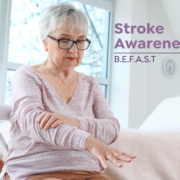Stroke Awareness
Strokes are one of the leading causes of disability and even death among seniors. Recognizing the signs early can decrease the risk of severe long-term effects and can help save a life. The following tips can help seniors in their community and their caregivers identify the common signs and symptoms of a stroke and what steps to follow when a stroke is suspected.
Understanding Strokes
A stroke occurs when there’s a blockage or a rupture in an artery leading to the brain. This pause in blood flow takes away the oxygen from the brain cells, causing them to die. The effects of a stroke depend on the area of the brain that’s affected; hence immediate medical intervention is critical to minimize brain damage.
The Common Signs of a Stroke
Remember the acronym B.E.F.A.S.T., as it outlines the major signs of a stroke:
- Balance: Watch for a sudden loss of balance or coordination, which might indicate a stroke.
- Eyes: Check for sudden trouble seeing in one or both eyes, including blurred or double vision, which could be signs of a stroke.
- Face Drooping: One side of the face may droop or be numb. Ask the person to smile. Is the smile uneven or lopsided?
- Arm Weakness: Is one arm weak or numb? Ask the person to raise both arms. Does one arm move downward?
- Speech Difficulty: Is speech slurred, are they not able to speak or hard to understand? Ask the person to repeat a simple sentence.
- Time to call 9-1-1: If someone shows any of these symptoms, even if the symptoms go away, call 9-1-1 and get them to the hospital immediately.
It’s important to note the time when the first symptoms appeared. Some treatment options are most effective when given soon after a stroke begins.
What To Do If You Suspect a Stroke
- Call Emergency Services: Don’t hesitate to call for emergency medical assistance if you or someone you know shows any of the symptoms mentioned above.
- Check the Time: Note the time when the first symptoms appeared. Emergency medical personnel will need this information.
- Do Not Drive: Do not attempt to drive to the hospital. Wait for emergency personnel. They can begin life-saving treatment on the way to the emergency room.
- Follow Up With Care: After emergency treatment, follow-up care is essential to help with recovery and to manage any underlying conditions that contributed to the stroke.
Prevention: Reducing Your Risk of Stroke
While some risk factors for stroke can’t be controlled, such as age and family history, there are still many ways seniors can lower their risk:
- Maintain a healthy diet rich in fruits, vegetables, and whole grains.
- Stay physically active.
- Control high blood pressure, cholesterol levels, and diabetes.
- Avoid smoking and limit alcohol consumption.
- Follow your healthcare provider’s guidance on medication management and healthy living.
Strokes can be sudden and frightening, but knowing how to recognize the signs and respond quickly can make a significant difference in the outcome. By learning and being ready, older adults can keep themselves and their loved ones safer from the possibly very bad effects of strokes. Remember, every second counts, so act F.A.S.T.
We hope this guide helps guide you into recognizing and responding to strokes. If you found this post helpful, please consider sharing it with friends and family. Together, we can raise awareness and save lives.
WelbeHealth provides full-service healthcare and personalized support to help you age well at home and in your community. Our Program of All-Inclusive Care for the Elderly (PACE) meets the changing needs of seniors, often at no cost. Here you are supported by a dedicated team that coordinates all your care needs. With access to highly skilled doctors, dentists, home care, physical therapy and much more, you are able to live a healthier, happier you. To learn if you qualify, visit our contact page or, call us directly at (888) 530-4415 | TTY 711.




















































